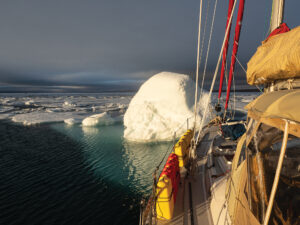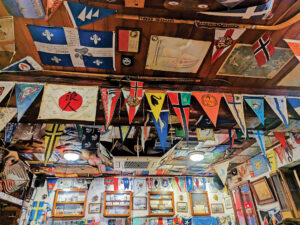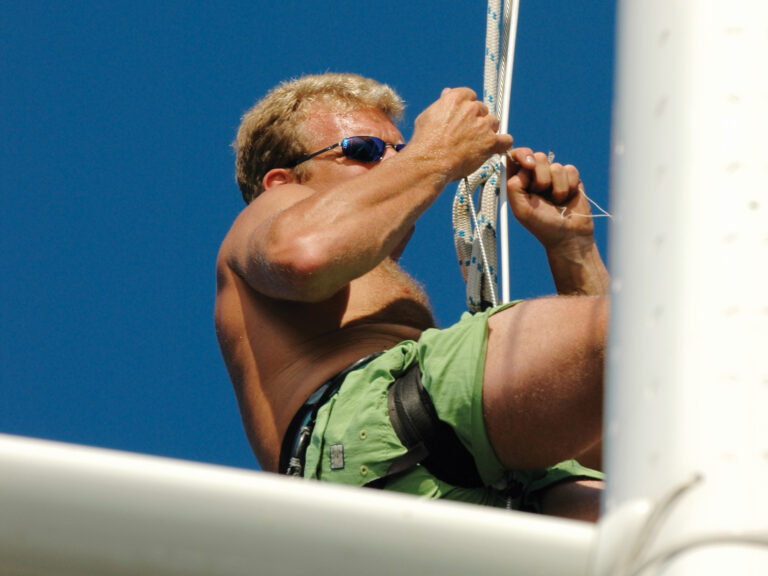I made two great trades today. For our defunct radar system, I got from a friend on a boat a couple transoms down from us a roll of slide film and a book of short stories by F. Scott Fitzgerald. And for two books—Bitter Fruit: The Story of the American Coup in Guatemala and Searching for Everado, A Story of Love, War and the CIA in Guatemala–I brought home from another marina a Spanish-English-Kuna dictionary, a copy of Barbara Kingsolver’s The Bean Trees, and Milan Kundera’s Life Is Elsewhere. For pure horse-trading pleasure, it doesn’t get a whole lot better than that.
| | Douglas installing the radome for our new radar unit * * *| Because _Ithakas_ not big enough for a large, permanent library, and because we decided against having a television or VCR, were always looking for the next good read, mostly found by swapping books in small hotels and cafes that have a “leave-one, take-one” sign over a bookcase, and with other cruisers eager to dump what theyve read and restock their own shelves.
As in most business exchanges weve learned to be wary. If another boat asks you over to trade books, unless you know the peoples reading habits, its best not to take over a full load of your best stuff, because they may be essentially romance fanatics or Danielle Steele people, and in the spirit of polite camaraderie you end up with stuff in which youre not too interested.
Reading is one of the great luxuries of cruising. I cant remember a time when Ive had the freedom to read so eclectically. Many weeks well munch our way through two or three books, and encourage the other to “read this one next so we can talk about it.” Some days we cant wait that long and feel compelled to read whole sections out loud to each other. If time is the most valuable currency of adulthood, cruising serves up reading as a pretty fine way to spend it.
| | The trading book shelf at the Space Monkey Cafe in Placencia, Belize* * *| Ive often thought that from kindergarten through 12th grade I learned two life skills, how to read and how to type, and later, as a teacher and psychologist, I was awed by how great the gap is between those who endure reading and those who crave it. When taking histories on new patients, Id often ask them to tell me about books and reading in their childhood home. Their responses often spoke volumes about their familys attitude toward the contemplative life and their own notions of an inner world where thinking precedes doing.
For instance, in the fifth grade I had a ferocious crush on Joanne Windmiller, whom I remember as being the most beautiful girl in Sussex Elementary School, and very smart. I heard her say to a friend that she really liked boys who read books, so I hotfooted it to the librarian, Mrs. Kronheim, and asked her what I should read. She wanted to know what I liked to do after school, who my heroes were, and what made me laugh. On the basis of that insightful interview she made recommendations. While I no longer recall the titles, except Rifles for Watie, I found pleasure in reading as well as an excuse to actually speak out loud to Joanne. Now that I’m about the age Mrs. Kronheim must have been back then, I wonder what’s become of these two women who so unknowingly influenced me.
Since Bernadette and I went cruising, I’ve been surprised at some of my reading. I thought I’d devote more time to poetry, but I haven’t at all. And I thought I’d finally catch up on some professional literature too, but instead I’ve shipped those books back to the States. I’ve spent lots of time reading contemporary writers who I hadn’t known before, and far less time on the classics. I still read some murder mysteries when I want to zone out completely, but they don’t satisfy me as much as they used to. The exception in true crime stories is Anne Rule, who’s best known for her Ted Bundy biography The Stranger Beside Me. I really liked her books And Never Let Her Go, A Rage to Kill, and_ Other True Crimes_.
| | The trading book shelf at Tortugal Marina, Rio Dulce* * *| On _Ithaka_ reading offers us, among other things, a distance from each other in a small space while bringing more people into our little world. I spent so much time with the witty and rapacious characters of Robertson Davies _Deptford Trilogy (Fifth Business; The Manticore; World Of Wonder)_ that I felt they became crew, and I fell in love with the two bachelor brothers who gave Kent Harufs _Plainsong_ (my favorite book of the past year) its droll backbone. These confirmed bachelors, who take in a pregnant high school girl, and are forced for the first time in their lives to reckon with a female. Bernadette is the female I reckon with, and their bewilderment matches my own and seems pretty real to me.
Gary Paulson’s Winterdance, The Fine Madness of Running the Iditarod reveals what a cakewalk cruising is. Once he decided to do the Iditarod, he had to become a dog to know his dogs. Paulson includes his wife’s amusing comments, which show just how much she understood the guy’s oddball traits and loved him just the same. This gave me hope.
In Ben Yagoda’s Will Rogers: A Biography, I was pleased, finally, to get a good glimpse at America’s lasso-twirling, prolific, prairie philosopher. Bernadette and I took turns reading to each other excerpts from some of Rogers’ columns. Same with M.F.K. Fisher’s food essays and passages from Diane Ackerman’s A Natural History of the Senses. Her science is so clear that she illustrates her points with poetry and song instead of academic blah-blah. Bernadette and I traded favorite lines with each other, and I had to restrict myself to reading “no more than one sense every day,” so I wouldn’t gorge on the entire book in a long night.
In Memoir from Antproof Case, Mark Helprin gave me the grandfather I always wanted, a quirky old man with a bizarre obsession about the lethal dangers of coffee, who recounts to his son a life as a spy, a pilot, a bank robber and an investment banker. Sitting in our cockpit or leaning back against the coach roof on the foredeck, I imagined I’d been right there with him during the bank heist and on the fugitive flight to South America. Boy, did we ever get away with that one!
| | Worried that wed lose the connection between the old radar cable and the new one while snaking the new one through the packed conduit, we spliced the two together. A bit of overkill, perhaps, but it worked.* * *| For female literary companionship, my fantasy life centered for a while on the fiesty Dalva, the main character in Jim Harrisons book of the same name. Shes the granddaughter of an American Indian who knew Sitting Bull and Geronimo, and through her wild family history, I got to see America in yet another light.
Nathan Englander invited me to muse on my Jewish roots in his compilation of short stories called For the Relief of Unbearable Urges, and indirectly encouraged me to reread the dybuk-filled tales of Isaac Bashevis Singer, who’s also long been a fantasized grandfather figure. In Englander’s title story, a rabbi gives a member of his temple dispensation to visit a prostitute, and all kinds of hell follows. Englander’s vignettes are not just for Jews. My Irish Catholic Commodore liked them too. Similarly, Interpreter of Maladies by Jhumpa Lahiri is not just for people from India. Her main character translates for a doctor who doesn’t speak his patients’ language, which is sometimes how I felt treating some of the people who consulted me.
In New York Days, Willie Morris showed Bernadette and me what it was like to hob-nob with the 1960s literati of New York City. At age 30, he became the editor of Harpers magazine, and we tagged along with him, and David Halberstam, and Norman Mailer, and George Plimpton, and just about everyone else you could think of who was rising to the top of the nonfiction writing world back then.
I worship at the altar of great essayists, and Joseph Epstein is my favorite. He stitches together literary criticism, biography and historical context with a needle that quickly bursts pretentious balloons. Epstein has published many anthologies (A Line Out for A Walk, Life Sentences, Literary Essays and Partial Payments, Essays on Writers and Their Lives, to name a few_),_ and they’re wonderful. Like a kid with his mittens attached to his coat, this guy must keep a notebook by his side at all times, capturing the quotations that amuse him. Then, somehow, he keeps track of them over the years, inserting them in his narratives and offering appetizers of what’s available elsewhere. Like Ackerman’s Senses, I had to ration his essays, so I wouldn’t finish a book too quickly.__ Among America’s younger, funny essayists writing today, David Sedaris’s Barrel Fever and Someday Me Talk Good; P.J. O’Rourke’s Holidays in Hell; and Christopher Buckley’s Wry Martinis take the cake.
| | Bernadette in an aft lazarette, snaking the new cable from the conduit in Ithaka’s interior up through the stainless-steel pole mount on the stern.* * *|
Theres one more genre of literature that plays a significant role in my life: marine technical manuals. I spend considerable time poring over these in the hopes of grasping matters about which Im clueless. This week, Bernadette and I, in only two days time, and more or less working togetherthe latter being an amazing accomplishmentsnaked the cables for and successfully installed our new Raytheon SL70 radar unit (with some adult supervision from our friend Harold). Raytheons pictorial directions were brilliant; there were NO words on the page. It was totally clear (idiot proof). However, from their manual, Ive extracted the following quotation that captured my attention: “If you wish to turn off the Main Bang Suppression when adjusting the display timing, press the MBS switch to toggle the setting.” I dont know about you, but I cant see why anybody would want to suppress the main bang.
[e-mail the Bernons](mailto: Ithaka@cruisingworld.com)








